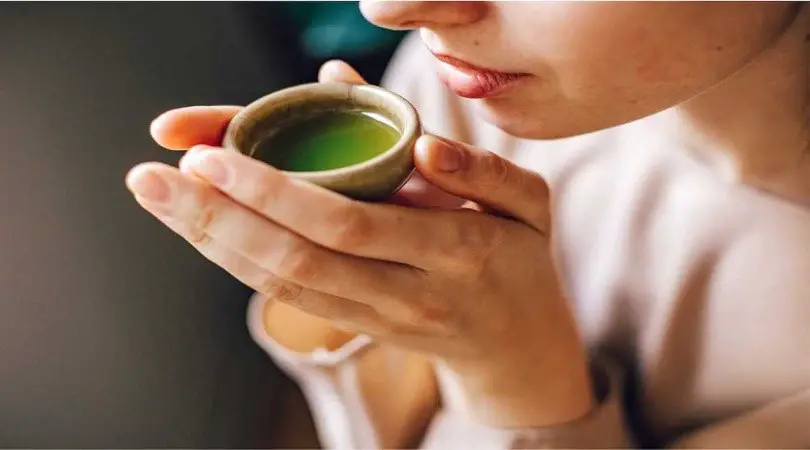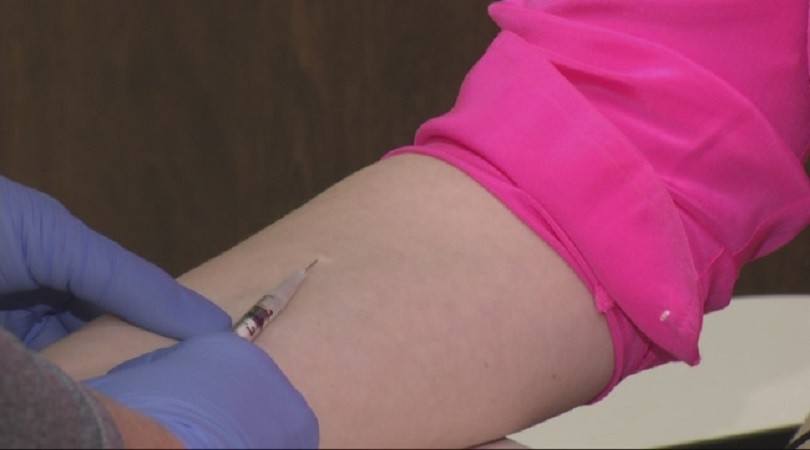Last Updated on January 6, 2025
Yes, pregnant women can drink throat coat tea as it is safe and can alleviate throat discomfort. Throat coat tea is a herbal blend made from licorice root and other soothing herbs that can help relieve sore throat symptoms and promote healing.
It is important to note that pregnant women should consult their healthcare provider before consuming any herbal remedy or supplement, including throat coat tea, to ensure it is safe for their specific circumstances. Drinking throat coat tea in moderation and as part of a balanced and healthy diet can provide relief for pregnant women experiencing throat irritation.

Credit: www.consumerlab.com
Related: Can You Eat Blue Cheese Dressing While Pregnant?
Understanding Throat Coat Tea
Throat Coat Tea: A Brief Introduction
Throat coat tea is a popular herbal tea known for its soothing properties and it is often used to relieve common throat ailments. This herbal infusion is believed to help alleviate sore throats, voice strain, and other discomforts. But can pregnant women safely drink throat coat tea?
Let’s delve into the primary ingredients in this tea to understand if it’s suitable for expecting mothers.
Primary Ingredients In Throat Coat Tea
Throat coat tea contains a blend of herbal ingredients that work synergistically to provide soothing relief for throat irritation. The key ingredients in throat coat tea are:
- Licorice root: Licorice root is widely known for its potential anti-inflammatory and soothing properties. It is believed to help alleviate throat discomfort and promote overall throat health.
- Marshmallow root: Marshmallow root is rich in mucilage, a gel-like substance that coats the throat to help relieve irritation and inflammation. It provides a soothing effect on the mucous membranes, which may ease throat soreness.
- Slippery elm bark: Slippery elm bark has a long history of use in traditional medicine for its potential therapeutic effects on the throat and respiratory system. It forms a protective layer in the throat, helping to reduce irritation and soothe discomfort.
- Wild cherry bark: Wild cherry bark is often used in herbal remedies for its potential expectorant properties. It may help relieve coughs and promote respiratory health, which can be beneficial for soothing throat irritation.
- Fennel seed: Fennel seed is rich in antioxidants and has been traditionally used to support throat health. It is believed to have soothing and calming effects, potentially reducing discomfort in the throat.
While these ingredients are generally considered safe for consumption, it is important for pregnant women to exercise caution and consult with their healthcare provider before drinking throat coat tea or any herbal remedy. Pregnant women have unique dietary needs, and certain herbs may not be suitable during pregnancy.
It’s always best to seek professional medical advice to ensure the safety and well-being of both the mother and the baby.
Exploring The Safety Of Throat Coat Tea During Pregnancy
The Effects Of Throat Coat Tea On Pregnancy
Throat coat tea is a popular herbal remedy known for its soothing properties for the throat and vocal cords. However, when it comes to pregnancy, it’s important to consider the safety of consuming this herbal tea. Let’s explore the effects of throat coat tea during pregnancy and what research and experts have to say about it.
Potential Risks And Concerns
While throat coat tea is generally considered safe for most individuals, including pregnant women, there are a few factors to consider when consuming it during pregnancy. Here are some potential risks and concerns:
- Herbs and ingredients: Throat coat tea contains a blend of herbs such as licorice root, slippery elm bark, and marshmallow root. While these ingredients are commonly used for their soothing properties, some herbs may have potential risks during pregnancy. It’s important to consult with your healthcare provider before consuming throat coat tea to ensure it aligns with your pregnancy journey.
- Licorice root: Throat coat tea contains licorice root, which has been linked to certain adverse effects during pregnancy. High doses of licorice root may increase the risk of preterm labor and cause hormone imbalances. It’s important to note that the licorice flavor in throat coat tea is often derived from natural flavors rather than pure licorice root extract. However, it’s best to exercise caution and seek medical advice if you have concerns.
- Gastrointestinal effects: Throat coat tea may have gastrointestinal effects, including potential laxative properties due to the presence of herbs like marshmallow root. While this may not be a concern for most individuals, pregnant women should be cautious as increased bowel movements could lead to electrolyte imbalances and dehydration. It’s always wise to monitor your body’s reactions and consult with your healthcare provider if you experience any digestive issues.
Related: Can I Eat Brownies During Pregnancy?
Research And Expert Opinions On Throat Coat Tea
While there isn’t extensive research specifically focused on the effects of throat coat tea during pregnancy, experts have shared their opinions based on available evidence and the properties of its ingredients. Here’s what experts have to say:
- Limited indications of harm: The american pregnancy association suggests that throat coat tea, in moderate amounts, is generally safe during pregnancy. However, it emphasizes the importance of consuming it in moderation and consulting a healthcare provider before incorporating it into your routine.
- Individual considerations: Every pregnancy is unique, and the effects of herbs can vary from person to person. It’s crucial to keep in mind that what may be safe for one pregnant woman may not be suitable for another. Your healthcare provider is the best resource to guide you based on your specific medical history and needs.
- Alternative options: If you’re hesitant about consuming throat coat tea during pregnancy, there are alternative remedies that can provide similar throat-soothing benefits. Gargling with warm saltwater or drinking warm honey and lemon water can help soothe your throat without the potential risks associated with herbal teas.
Remember, when it comes to consuming any herbal product during pregnancy, it’s always best to err on the side of caution. Consult with your healthcare provider to determine if throat coat tea is suitable for you and your baby.
Alternatives To Throat Coat Tea For Pregnant Women
Can pregnant women drink throat coat tea? Before we delve into the options, let’s first understand if throat coat tea is safe for pregnant women. Developed to soothe the throat and provide relief from irritations, throat coat tea is a popular choice for many individuals.
However, when it comes to pregnant women, it is important to exercise caution and consider alternatives that are safe and beneficial for both mother and baby. In this section, we will explore safe herbal teas for soothing pregnancy discomfort and natural remedies for sore throats during pregnancy.
Safe Herbal Teas For Soothing Pregnancy Discomfort
Pregnancy can bring about various discomforts, and finding safe remedies becomes crucial. Here are some herbal teas that are considered safe for pregnant women:
- Ginger tea: Known for its ability to ease morning sickness and nausea.
- Peppermint tea: Helpful in relieving digestive issues such as bloating and gas.
- Chamomile tea: Helps promote relaxation and sleep, easing pregnancy stress.
- Lemon balm tea: Known for its calming properties, reducing anxiety and promoting relaxation.
Natural Remedies For Sore Throats During Pregnancy
Sore throats can be particularly bothersome during pregnancy. Here are some natural remedies that are safe for pregnant women to alleviate the discomfort:
- Warm saltwater gargle: Mixing half a teaspoon of salt in warm water can help reduce inflammation and kill bacteria in the throat.
- Honey and warm water: A mixture of honey and warm water can provide soothing relief for a sore throat. It is important to note that honey should not be given to infants under one year old.
- Steam inhalation: Inhaling steam from a bowl of hot water or a warm shower can alleviate congestion and soothe the throat.
While throat coat tea may not be the ideal choice for pregnant women due to the lack of sufficient evidence on its safety, there are several safe alternatives available. Ginger tea, peppermint tea, chamomile tea, and lemon balm tea are known for their soothing properties and can be consumed during pregnancy.
Additionally, natural remedies such as warm saltwater gargles, honey and warm water, and steam inhalation can provide relief for sore throats. Remember to consult with your healthcare provider before trying any new herbal tea or remedy during pregnancy to ensure it is safe for you and your baby.
Related: Can Pregnant Ladies Eat Fondue?
Safe Consumption Guidelines For Herbal Teas During Pregnancy
Pregnancy is a time where a woman’s health becomes a top priority. With so many changes happening in the body, many women turn to herbal teas for comfort and relief. One popular option is throat coat tea, known for its soothing properties.
But can pregnant women safely consume this herbal tea? Let’s explore the safe consumption guidelines for herbal teas during pregnancy.
Importance Of Consulting A Healthcare Professional
Before incorporating any new herbal tea into your pregnancy routine, it is essential to consult your healthcare professional. They will be able to provide personalized advice based on your unique needs and medical history. Keep in mind that every pregnancy is different, and what may be safe for one woman may not be suitable for another.
Your healthcare professional can guide you on the appropriate herbal teas to consume during your pregnancy.
Tips For Choosing And Preparing Herbal Teas When Pregnant
When it comes to choosing and preparing herbal teas during pregnancy, following these tips can ensure a safe and enjoyable experience:
- Research the herbs: Not all herbal teas are safe for pregnancy. Some herbs may cause contractions or have adverse effects on fetal development. Always research the specific herbs used in a particular tea before consuming it.
- Opt for pregnancy-friendly herbs: There are certain herbs that are generally considered safe for pregnant women, such as ginger, peppermint, and chamomile. Look for herbal teas that contain these pregnancy-friendly herbs.
- Read labels carefully: Make it a habit to read the labels of herbal teas thoroughly. Look for indications that the tea is safe for pregnancy or consult with your healthcare professional if you’re uncertain.
- Use loose leaf teas or tea bags: Loose leaf teas or tea bags are preferable to pre-bottled teas, as they allow you to control the strength and concentration of the tea. Always follow the recommended brewing guidelines to ensure the optimal flavor and benefits.
- Limit caffeine intake: Be mindful of the caffeine content in herbal teas, as excessive caffeine consumption during pregnancy can lead to complications. Opt for caffeine-free or low-caffeine herbal teas to minimize potential risks.
- Avoid additives: Some herbal teas may contain additives or artificial flavors that are best avoided during pregnancy. Stick to all-natural, organic herbal teas whenever possible.
- Moderation is key: While herbal teas can offer numerous health benefits, moderation is essential. Avoid excessive consumption of any one type of herbal tea and vary your choices to benefit from a range of nutritional properties.
- Listen to your body: Pay attention to how your body reacts to different herbal teas. If you experience any adverse symptoms or discomfort after consuming a particular tea, discontinue its use and consult your healthcare professional.
Remember, the safety of herbal teas during pregnancy may vary depending on individual circumstances. Always consult your healthcare professional to ensure the consumption of herbal teas aligns with your specific needs and medical background. By following these safe consumption guidelines, pregnant women can enjoy the soothing benefits of herbal teas while prioritizing their health and that of their developing baby.
Frequently Asked Questions On Can Pregnant Woman Drink Throat Coat Tea?
Can Pregnant Women Drink Throat Coat Tea?
Pregnant women should avoid throat coat tea as it contains several herbs that may not be safe during pregnancy.
Is Throat Coat Tea Safe During Pregnancy?
It is not recommended for pregnant women to drink throat coat tea due to potential risks associated with certain herbs used in the tea.
What Are The Potential Risks Of Drinking Throat Coat Tea During Pregnancy?
Drinking throat coat tea during pregnancy may pose risks as the tea contains herbs that could potentially stimulate the uterus or cause hormonal imbalances.
Are There Any Alternatives To Throat Coat Tea For Pregnant Women?
Yes, there are several alternative teas that are safe for pregnant women to drink, such as chamomile or ginger tea.
What Can Throat Coat Tea Do To A Developing Fetus?
Throat coat tea contains herbs that could potentially affect a developing fetus, so it is best to avoid drinking it during pregnancy.
Conclusion
To sum up, while throat coat tea is generally considered safe and beneficial for soothing sore throats and supporting overall throat health, pregnant women should exercise caution and consult with their healthcare provider before consuming it. Although the tea contains various herbal ingredients that have been traditionally used in pregnancy, some of them may carry potential risks.
The active ingredients in throat coat tea, such as slippery elm bark and licorice root, should be used in moderation and with knowledge of any potential allergic reactions or drug interactions. It is advisable for pregnant women to opt for alternative remedies like honey and lemon mixed with warm water to relieve discomfort and maintain hydration.
Overall, taking a cautious approach and seeking professional medical advice is crucial to ensure the safety of both the pregnant woman and her baby.











